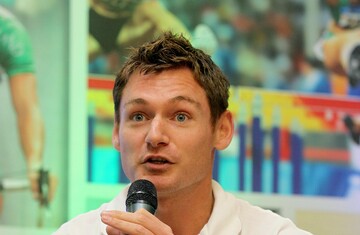SPORT CAN BE cruel at the best of times.
Since the astonishing success of Sonia O’Suillvan and before her, John Treacy, Irish people have come to expect nothing but the best from their athletes at the Olympics.
Yet despite certain athletes producing some impressive individual results in more recent years, casual fans often tend to criticise anything short of a medal.
One man who has first-hand experience of the often frustrating life of an Irish athlete is David Gillick. The Dubliner, who is now retired, enjoyed a career that included gold medals in the 400m events of the 2005 and 2007 European Indoor Championships.
Looking ahead to the 2016 Olympics in Rio, Gillick feels it is important that Irish people maintain a realistic outlook when judging athletes’ performances.
We’ve got the likes of Thomas Barr and Mark English, who are progressing pretty well. But we have to manage our expectations on the track… Medal-wise, it’s going to be difficult, but I don’t think we should hinge success solely on medals.
“In boxing we’re very strong and golf with McIlroy, there’s an opportunity for Ireland to get more medals than in recent Olympics, but I still think we need to get our structures in order and focus in on a pathway — junior level, U23, up to senior level, that’s how we’re going to retain talent and allow talent to flourish.
Generally, people wake up to the Olympics every four years and just focus in on the shiny medals. But if we can get the national records, if we can get athletes into finals or close to finals, I think that’s what success is going to look like for Ireland.”
Gillick also believes certain individuals don’t always get the level of credit they deserve for their achievements.
“We’ve actually had athletes over the last couple of years who have done extremely well on global terms.
If you look through the results, we’ve a lot of people who are due to be upgraded due to other countries’ athletes cheating (by using performance-enhancing drugs) — the likes of Olive Loughnane, Rob Heffernan, Derval O’Rourke, they’re due medals.
“When the Olympics have come around, we maybe haven’t got a medal on the track (for a long time), but Olympic medals are very hard to come by, so I don’t think it’s underachieving.”
It’s been a turbulent few months for the athletics world, with controversies involving the International Association of Athletics Federations (IAAF) and doping further tarnishing the scandal-ridden sport’s image.
Gillick believes recent revelations reflect badly on the sport’s authorities, and in particular, the IAAF President Sebastian Coe.
From the top, I think it’s going to get worse before it gets better. To be honest, I’m not convinced by Lord Coe. Yes, he’s making changes, but it’s startling that he’s been in there for a couple of years as Vice President when all this stuff has come out, so if there’s one country involved, I think there are a few countries involved.
The 32-year-old Dubliner also firmly believes that Irish athletics’ anti-doping procedures are far less flawed than certain other countries’ systems appear to be.
“When it comes down to our own testing, we are very good at testing our athletes, we invest money in it, we make sure that athletes are tested on a regular basis — I can verify that. I just think it’s unfair to the athletes that are clean and abide by the rules (when others dope).
You have other countries that have systematic doping. Then the top brass keep things quiet — it’s shameful from the powers that be. I think there’s a lot more going to come out in the next weeks and months. It’ll be interesting to see if the IAAF are strong and have the confidence to ban Russia from Rio.
“I personally don’t think they’re going to stand by (Russia’s ban). At the last congress in March, I have a feeling that they’ll be allowed compete in Rio, which I don’t think is good for the sport overall. You have to lay down the law and send a message of zero tolerance out.”
‘David Gillick’s Kitchen’ is published by Mercier Press. More info here.
David Gillick is part of the NewBreed schools initiative supported by New Balance and Athletics Ireland. It aims to showcase the benefits of athletics for all sports — speed, agility, strength and power makes you a better player overall, while promoting exercise in the class room with three simple tests: 20 metre sprint; vertical jump; horizontal jump.










Popovich, a total class act.
Still fancy the Cavs to beat them in the finals
@Darren Doyle: not so sure – Golden State a much more complete team with Durrant in full-flight now, and if they remain injury-free (and the Cavs have at least 2 more games to play v Celtics) then the momentum GS have now could be unstoppable.
Hold on. Did this idiot just compare Steph Curry to Kobe Bryant? Kobe is one of the all time greats, 5 time NBA Champion, 18 time all-star. Curry is a good shooter but he should never be confused an all time great. Blasphemy.